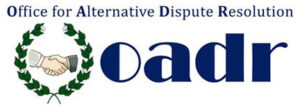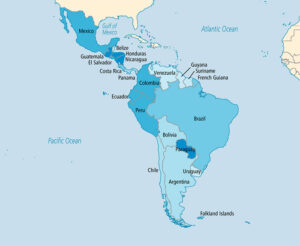 The Office for Alternative Dispute Resolution ( OADR) , a s t a t u t o r y o f fi c e c r e a t e d u n d e r R e p ub l i c Act No. 9285 (2004) or the Alternative Dispute Resolution Act of 2004 to promote, develop and expand the use of ADR in the private and public sectors, recently created two technical working groups (TWG) to study needful changes to the law on mediation and arbitration.
The Office for Alternative Dispute Resolution ( OADR) , a s t a t u t o r y o f fi c e c r e a t e d u n d e r R e p ub l i c Act No. 9285 (2004) or the Alternative Dispute Resolution Act of 2004 to promote, develop and expand the use of ADR in the private and public sectors, recently created two technical working groups (TWG) to study needful changes to the law on mediation and arbitration.
OADR Executive Director Bernadette C. Ongoco issued Office Order No. 1419 dated September 17, 2015 creating the TWGs and directing them to seek the assistance of ADR organizations in drafting the amendatory provisions of Chapters 3 to 7 of the ADR Act of 2004.
The constitution of the TWGs was the initiative of Atty. Jesusito Morallos who proposed to OADR that they allow ADR organizations to participate in the process of amending RA No. 9285. The Office Order recognizes the ADR organizations’ important role as partners not only in promoting and advocating the use of the various ADR modes of resolving disputes but also in addressing the evolving requirements of the ADR environment.
PDRC has nominated to OADR Trustees Salvador Castro, Roberto Dio and Shirley Alinea as well as Asst. Secretary General Francisco Pabilla, Jr. for the TWG on Mediation, and Trustees Custodio Parlade, Victor Lazatin, Salvador Panga, Jr., Roberto Dio, Arthur Autea, and Gwen Grecia-de Vera for the TWG on Arbitration.
Arbitration in Spain and Latin America
 In an increasingly global economy, the existence of different legal systems in many countries is not an obstacle to the development of commercial relationships or the effective resolution of disputes, where arbitration has developed together with the traditional system of tribunals.
In an increasingly global economy, the existence of different legal systems in many countries is not an obstacle to the development of commercial relationships or the effective resolution of disputes, where arbitration has developed together with the traditional system of tribunals.
In this article, I will briefly discuss arbitration in Spain and in Latin America and propose that Spain can be the perfect venue for arbitration of disputes coming from Latin America and Asia.
Legal aspects
The enactment of a new Arbitration Act in Spain in 2003, Ley 60/2003 on December 23, 2003, recently amended in 2011, allowed economic players to choose arbitration as a mode of resolving disputes. Through this Act, Spain sets itself as a natural venue for international arbitration, especially for disputes from Latin America.
The law adopts the UNCITRAL Model Law, which gives legal security to economic agents with whom Spain keeps commercial relationships. Spain also signed the New York Convention of 1958 without any reservation.
In Latin America, recent economic developments have made international arbitration an important mechanism to resolve commercial disputes. In this sense, Latin America has overcome its traditional hostility to arbitration in two ways:
First, when almost all countries in the region signed the New York Convention of 1958 and the Panamá Convention of 1975 (Inter-American Convention on International Commercial Arbitration). More importantly, arbitration was included as a mode of resolving disputes arising out of economical treaties such as the North American Free Trade Agreement (NAFTA), the Mercado Común del Sur or Mercosur, and the Andean Community (Pacto Andino).
Second, a new arbitration framework has emerged in Latin America. Over 15 countries in the region have adopted a new arbitration act. There were different political and economic factors that influenced this change but one of the most important was the adoption of the UNCITRAL Model Law.
Economic aspects
The volume of trade between Latin America, Asia and the rest of the world is growing.
China is currently the main commercial partner of Brazil and Chile, and the second biggest trading partner of Argentina and Perú. China is slowly taking over the dominant position of the United States and the European Community, Spain included. Out of the estimated global trade of $17,930,469,869.77 in 2012, the amount of trade between Latin America and Asia was about $651,477,782.15.
The volume of trade Latin America and Asia has changed dramatically over the years. From 2002 to 2012, for example, the value of China’s exports rose from US$1.7 billion to US$24.4 billion, an increase of 1,400%. Japan’s exports grew from US$13.8 billion to US$30.6 billion, an increase of 300%. Korea’s exports quadrupled from US$10 million to US$40 million.
The fact of the economic development in Latin America and its relationship with the rest of the world, especially Asia, has a clear significance: the best way to solve future commercial disputes is by all means through arbitration.
Spain as venue of arbitration for conflicts between Latin America and Asia
For historical reasons, Spain has a constant presence in Latin America for more than 500 years. Spain is linked legally and culturally to that part of the world that it considers its other “shore,” separated only by the Atlantic Ocean.
Spain’s presence is cemented by a common tongue, Spanish, which is quite close to the other predominant language, Portuguese. More important still, both share a similar legal system, with legal institutions that are, in many cases, very much identical. This permits Spain and the Latin American countries, the two “shores,” to talk and understand each other easily.

This in turn has allowed Spain, through its companies, to emerge as the second largest investor in Latin America after the U.S. The Spanish investments are in finance, construction, oil, infrastructures, telecom, publishing, and others. Asian business may use Spain and its companies as a springboard—a form of triangulation—to expand their presence in Spain or Latin America and vice versa.
Because of these, Spain is an ideal arbitration center for disputes related to Latin America. Spain is also the perfect venue for resolving disputes involving investments made by other countries in Latin America, as in the case of China, Japan, Korea and other Asian countries.
For instance, China has substantial investments in different Latin American countries, becoming one of the biggest investors in the region together with the U.S. and Spain. Its investments will, in the near future, give rise to disputes. To resolve such disputes, the parties will seek out an appropriate means and an appropriate venue. Arbitration may be the perfect means and Spain may be very well be the right venue.
Arbitrators accredited by the Spanish arbitration courts, for the most part, speak and use the same language as the Latin American countries. What is more important, however, is that they know the legal system, since both are so similar.
Most important, Spanish arbitration courts can act with impartiality and independence in any dispute arising from any Latin American country. It follows that Spain is the perfect venue to settle disputes having their origins in investments in Latin America made by any country coming from Asia.
